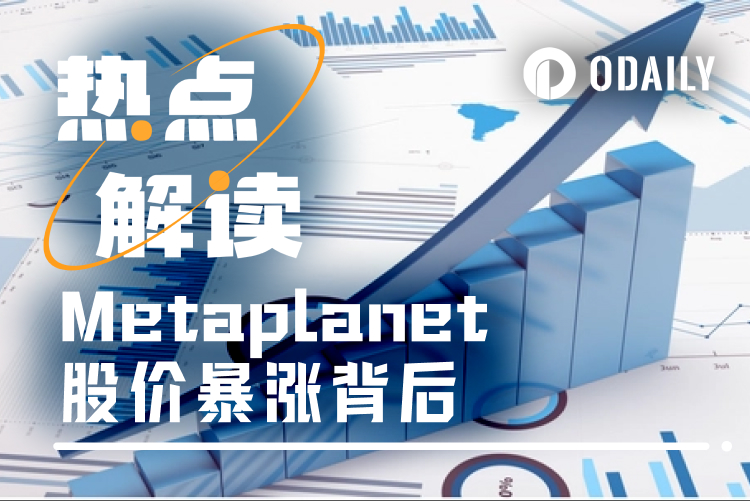BTC reserve power is being realized, Metaplanet, the king of Asian currency holders, doubled its share price in January
Original | Odaily Planet Daily ( @OdailyChina )
Author | Dingdang ( @XiaMiPP )

On May 20, the share price of Metaplanet, a Japanese listed company, rose above 780 yen, a single-day increase of 14.6%, and doubled in the past month. Simon Gerovich, the company's CEO, revealed that Metaplanet has become one of the most shorted stocks in the Japanese market.
This situation can't help but remind people of the US stock company Strategy (formerly MicroStrategy), whose decision to take the lead in incorporating Bitcoin into the corporate balance sheet not only brought financial success to itself, but also set off a wave of traditional companies embracing crypto assets around the world. However, as the market value climbed, Strategy also became the focus of short-seller hunting. Today, Metaplanet seems to be repeating the script of this long-short confrontation, writing its own legend driven by the Bitcoin strategy.
Metaplanet: Financial breakthroughs under Bitcoin strategy
Metaplanet's bold decision to establish Bitcoin as a core treasury asset is not an impulse. It is based on a deep understanding and forward-looking judgment of the increasingly complex global financial environment.
As a Japanese company, Metaplanet is facing the dual dilemma of the continued depreciation of the yen and the long-term coexistence of ultra-low interest rates. Traditional assets are difficult to effectively maintain and increase their value under this background. Bitcoin, with its scarcity, decentralization and anti-censorship, has become a powerful hedging tool - not only to hedge against inflation, but also to fight against the uncertainty of monetary policy.
Since 2024, Metaplanet, with the assistance of Sora Ventures, has continued to buy Bitcoin through additional stock issuance and bond financing, becoming Japan's first listed company to hold Bitcoin on a large scale. This not only marks its firm move towards the global crypto economy, but also sets a groundbreaking example for Japanese companies in the field of digital assets.
Metaplanet's financial report for the first quarter of 2025 fully confirms the effectiveness of this strategy. The report shows that the company's revenue reached 6.139 million US dollars, an increase of 8% month-on-month and a surge of 943% year-on-year; net profit reached 4.151 million US dollars, an increase of 11% month-on-month. Among them, 88% of the profit came from Bitcoin options trading, which shows that crypto assets have become the backbone of its income structure.
As of now, Metaplanet holds 6,796 bitcoins, ranking 10th among listed companies in the world and first in Asia. The company also plans to increase its bitcoin reserves to 10,000 by the end of the year. Despite being constantly hunted by short sellers, its stock price has doubled in a short period of time, and the market has clearly voted for its "Bitcoin-based" strategy.
Expanding perspective: Global companies are jumping on Bitcoin
The success of Metaplanet is just a microcosm of the global corporate embrace of the Bitcoin craze. Since 2025, more and more companies are incorporating Bitcoin into their balance sheets in a diversified way and building their own encryption strategies.
Strive: Borrowing Mt.Gox debt to hold coins at a low price
Strive, led by Vivek Ramaswamy, has chosen an alternative path - acquiring about 75,000 bitcoins at a discount by acquiring the bankrupt Mt.Gox exchange's claims. According to regulatory documents, the company is working with 117 Castell Advisory Group LLC to complete the acquisition of the court-ordered claims before Mt.Gox starts paying on October 31, 2025.
This "contrarian investment" strategy not only takes full advantage of market structural opportunities, but also dilutes equity through reverse mergers, thereby increasing the number of Bitcoins held per share and bringing potential value-added to shareholders.
AsiaStrategy: Dual-track transformation from luxury goods to Bitcoin
AsiaStrategy, formerly known as Asian watchmaker Top Win, changed its name in 2025 and launched a strategic transformation to Bitcoin. After partnering with Sora Ventures, the company's stock price soared more than 60% in pre-market trading. Not only did founder Jason Fang join the board of directors, he also served as co-CEO with CEO Tony Ngai, marking the company's official transformation from traditional manufacturing to financial technology integration.
AsiaStrategy will continue to purchase Bitcoin while maintaining its watch business, providing new imagination space for traditional industries to explore digital assets.
Meliuz: Brazil's retail companies' inflation hedging path
South American companies are also seeking safe havens amid high inflation and currency depreciation. Brazilian listed company Meliuz has proposed amending its articles of association to include Bitcoin investment in its official corporate purpose. The proposal will be voted on at the shareholders' meeting on May 6, 2025. Once approved, the company will continue to invest in Bitcoin based on operating cash flow, demonstrating its recognition and reliance on the long-term value of crypto assets.
GameStop: A cautious attempt by a retail giant
GameStop, an American gaming retailer, is also gradually embracing crypto assets. Its revised investment policy in 2025 allows the company to include Bitcoin and stablecoins in the treasury asset portfolio for the first time. Although the document emphasizes volatility risks, this move is enough to reflect its cautious affirmation of the potential of crypto assets and provides an important signal for the transformation of more traditional companies.
Conclusion
Metaplanet's breakthrough may be just the beginning. It represents the exploration and transformation of new asset allocation methods by global companies in an uncertain era. Whether it is direct purchase, debt arbitrage, or business integration and strategy testing, Bitcoin is becoming an indispensable part of corporate asset management logic.
As more and more companies begin to consider Bitcoin as "digital gold" and incorporate it into their core financial layout, we are witnessing the unfolding of a new global asset reconstruction experiment.



